 Abengoa
Abengoa
Annual Report 2011
- Activities
- Activities
- Industrial Production
- Our Business
Bioenergy
Over 2011, Abengoa became entrenched as one of the leading biofuel producers in Europe (1,500 ML of annual production capacity), the United States (1,440 ML) and Brazil (235 ML), making for total installed capacity of 3,175 ML.
In Europe in 2011, bioethanol prices were driven by the balance of supply and demand created by imports subject to only light tariffs. Though volatile, bioethanol prices did not follow the upward trend in the commodities market generally, owing to troubled harvests and the pressure of the global imbalance of supply and demand.
In the United States, the ethanol market started 2011 in close alignment with the pattern seen in the previous year. The industry was in a state of overcapacity and margins were pared down rigorously to maintain output. Mid-2011 saw some improvement in the balance of supply and demand, possibly as a result of a rise in demand in preparation for the summer, continued growth of 10 % blends, and the development of the export market.
In Brazil, bioethanol is sourced wholly from sugarcane. In 2011 the Brazilian market performed anomalously. Bioethanol supply dropped off throughout the year, reflecting rising sugar prices (producers prioritized and maximized sugar production) and a decline in Brazilian sugarcane output, which was 18 % down year on year. The market took in imports to meet internal demand.
High ethanol prices are expected in 2012, given that supply on the Brazilian market will continue to fall short and sugarcane output will be scant.
Since petrol prices in Brazil are artificially capped by government regulation, Brazilian bioethanol prices are driven chiefly by global demand and supply for sugar and international free trade policies. In the wake of the 2008 economic downturn, the biofuels market remains turbulent, creating both risks and opportunities for global operators. Abengoa’s production and logistics know-how and its presence on several continents will garner it an attractive chance to grow.
In 2011, Abengoa began a far-reaching process of diversification and shareholder value creation by incorporating new lines of business that extract fresh value from our existing assets. As a result, it has identified opportunities to use the sugar produced at all its facilities —from cereal starch, cane sugar or lignocellulosic biomass— and ferment it to make new biofuels and bio-based products. This process begun in 2011 will support future diversification of products and the production of higher value-added compounds and fuels.
Abengoa has set the following targets in the area of biofuels:
- To become a global benchmark in the production and commercialization of biofuels and bio-based chemicals manufactured from renewable raw materials.
- To be recognized as a leading international company in research and development, widely respected for its technological innovation in converting fermentable sugar biomass to bioethanol, biodiesel, aviation kerosene and bio-based chemicals, and adapting first-generation assets to diversify the product portfolio.
- To provide an optimal work environment to attract the best possible human talent and maintain operational excellence.
- To attract the interest and win the respect of the financial community through sustained growth and technological innovation.
Abengoa, with operations in the area of biofuels in five countries on three different continents, currently owns fourteen plants for producing bioethanol and other process-related coproducts, along with a biodiesel production plant, distributed as follows:
- Europe (Spain, France and the Netherlands);
- North America (United States), and
- Latin America (Brazil).
These plants cater to the demands of global bioethanol markets from practically any corner of the world. Most sales stem from current producer countries, as well as Germany, the United Kingdom, Scandinavia, Italy and South Asia.
Abengoa seeks out growth by consolidating operations in all business areas, investing continuously in technology to streamline production and sales processes, and developing new biofuel and bio-based chemicals production technologies that enable the company to use sustainable raw materials and thus curb greenhouse gas (GHG) emissions.
Activities adhere to best industrial practices. The company has been striving for many years to obtain sustainable raw materials and produce sustainable products so as to make sustainability the cornerstone of its business. This commitment to the environment is beginning to make itself felt in society, and most governments are now addressing this overriding concern through legislative change.
The strategic plan explores the impact that sustainability can have on the company, based on the information provided by market reports or internal reports.

The main objective for 2012 and subsequent years is to continue performing all activities in accordance with best practices in terms of risk management and process efficiency and making sustainability an absolute priority.
A key objective will be to consolidate production and sales. The company’s global presence will enable it to harness arbitrage opportunities that are sure to arise on the markets. In 2012, the company will continue to focus on quality, measured in terms of sustainability ahead of quantity. The company’s main concerns will be to improve the sustainability of all production assets, to consolidate operations at the latest plants to have been commissioned, and to continue construction of a second-generation bioethanol plant in Hugoton, United States.
Recycling business
Despite the tough prevailing economic climate, the recycling market continues to evolve steadily, driven by increased regulatory pressure and rising environmental awareness at the global scale. World population increase is another growth vector for the industry.
Business has gradually improved over the course of 2011 and is set to grow further in the coming years.
Abengoa provides innovative and technologically viable solutions for industrial waste recycling, and aims to become a world benchmark in this sector, while helping to forge a more sustainable world. This commitment is reflected in its lines of business:
- Steel and galvanization waste recycling:
- Manages common steel and stainless steel waste, as well as waste from the galvanization process by recycling a variety of metals, doing away with the need to dump them and minimizing the requirement for further mining. The company is the European leader in steel waste recycling.
- Offers the iron and steel industry high value-added environmental services through the treatment and valorization of the residual dust generated from both common and special steel production processes, as well as other waste containing zinc from the steel galvanization sector.
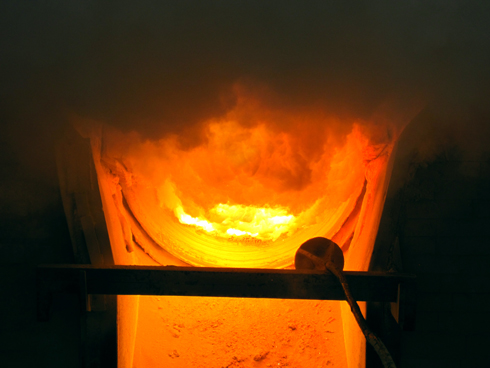
View of a zinc furnace in Amorebieta
- Aluminum waste and salt slag recycling:
- With its Europe-wide waste and raw material procurement network, Abengoa is one of the European leaders in primary aluminum production waste recycling, having an annual capacity of 225,000 t distributed across three recycling plants. Abengoa can use any aluminum-content waste to produce new alloys without generating any new waste in the process, thus fully closing out the cycle.
- As regards spent pot lining (SPL) and salt slag recycling, Abengoa boasts an annual capacity of 630,000 t, distributed over five sites. This figure can be seen to be particularly significant when viewed in the context of the fact that the total European salt slag market is approximately 1 Mt.
- Abengoa is the world leader in selling related machinery and technology, such as ingot conveyor belts..
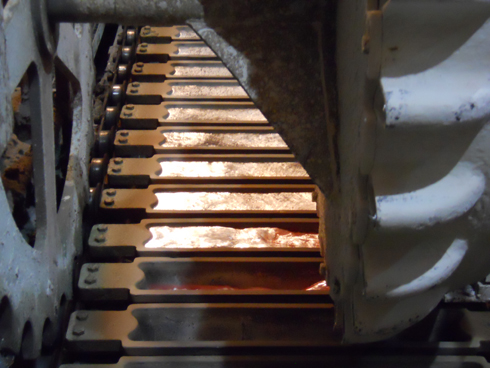
Filling ingot molds at an aluminum plant.
- Industrial Waste Management:
In this area —embracing the group’s industrial waste management businesses in Spain and Latin America, sulfur recovery and plastics and PCB management— Abengoa:
-
Manages, transports, treats and temporarily stores hazardous and non-hazardous industrial waste for valorization, recovery, reuse or eventual controlled disposal.
-
Designs and builds infrastructures for safe, efficient and environmentally friendly waste management.
-
Recovers wastes generated by the petrochemical industry by applying a clean, safe process, thus providing solutions to the environmental issues raised by oil companies’ sulfur wastes. The process produces sulfuric acid and oleum (a compound rich in SO3) for subsequent commercialization.
-
Abengoa manufactures special low density polyethylene pellets by recycling film used as greenhouse covering.
-
The company collects, transports and disposes of transformers, condensers and materials contaminated with PCB (polychlorinated biphenyls).
Abengoa aspires to become a world leader in industrial waste recycling and management, thus contributing to sustainable development.
Within the industrial production segment, the company has a strong international presence, with recycling businesses in 11 countries and operating out of numerous sites in Europe, Turkey and Latin America. Its ambitious strategic plan combines organic and inorganic growth to continue to gain size in the markets where it operates.
In the steel recycling business, strategy focuses on entrenching the company’s present European leadership by diversifying markets and entering other regions, thus supporting international expansion.
In addition, forthcoming operational improvements will sharpen Abengoa’s competitive edge in important ways.
Growth strategy in the aluminum recycling business area envisages organic growth in Central Europe and international expansion in the salt slag, SPL and other waste businesses, thus promoting the company from European leader to worldwide benchmark.
In industrial waste management, efforts will focus on growth, with a research emphasis on recovery/value extraction for biofuels and bioplastics production.
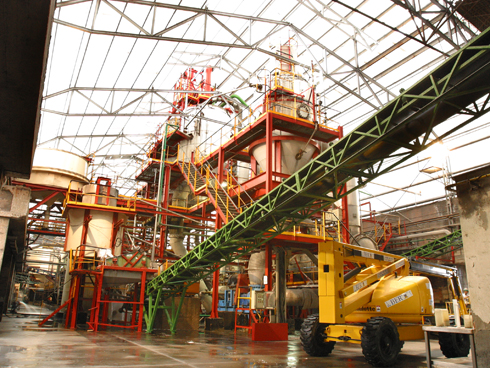
Abengoa crystallizers in Valladolid, Spain
Abengoa’s business is based on sustainable development, around which its activities and strategies revolve. Through this business model, Abengoa’s activities are aimed at:
- Developing sustainable solutions for managing industrial waste while fully respecting and preserving the environment.
- La reintroducción de materias primas secundarias en los ciclos productivos. Reintroducing secondary raw materials into productive cycles.
- Waste-free production.
- Offering a new range of waste treatment services for industry.
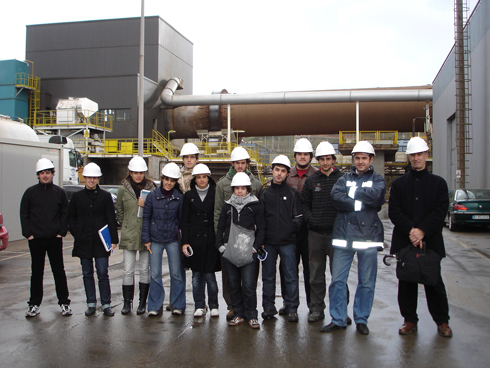
Bilbao engineering faculty students visit facilities in Erandio (Spain)
For 2012, Abengoa’s strategic objectives in the area of industrial waste recycling are to:
- Entrench its leadership position in the European steel waste recycling market by continuing to execute its strategic plan, which stipulates the development of new capabilities in Europe and Turkey, where we now have a presence.
- Develop the steel waste recycling business in new regions of Southeast Asia, which offer attractive opportunities.
- Achieve organic growth in Europe in the steel waste recycling business by leveraging its leadership position and capabilities in salt slag treatment.
- Move forward with developing the salt slag business in the United States and the Middle East, where we already have some projects under development.
- Make significant R&D progress in the industrial waste management business unit, with a focus on urban waste treatment to produce biofuels.
Abengoa will also remain vigilant throughout 2012 for possible opportunities for inorganic growth, particularly in the steel and aluminum waste recycling sectors.
Solar power
In addition to the energy development and sales concession business, Abengoa develops groundbreaking solar technologies within a global market offering huge growth potential.
Due to its ongoing efforts in research and development, the company has proprietary technology which places it at the forefront of solar technologies able to generate clean and efficient power. The objective is to lower the cost of solar power so as to quickly become competitive with fossil fuels, while taking the cost of emissions into consideration.
In the industrial production segment, Abengoa’s business focuses on the development of new technologies through research, development and innovation, and the manufacture and sale of key components for solar thermal and photovoltaic plants. In addition, Abengoa provides industrial systems based on solar thermal or photovoltaic technology to generate industrial steam and electricity at industrial facilities.
Abengoa conducts research, development and innovation in Spain and the United States:.
Spain: Solucar complex in Seville, with pilot plants under construction and in operation.
United States: Denver, with an R&D center.
Since the inception of the solar business, Abengoa has acquired a wealth of experience along the different stages of the solar thermal business value chain. This vertical integration enables Abengoa to achieve synergies between the activities of development, operation and technology, such as designing optimal solutions, controlling key components and their supply, and enhancing cost competitiveness.
In 2012, an increasingly competitive environment will mean that Abengoa will continue to pursue innovation in its priority solar technologies to retain its industry leadership and its edge over the competitors. The company will continue its ongoing collaboration with leading research institutions to lower costs and raise the efficiency of its products.
Hydrogen, energy crops and ocean energy divisions
Hydrogen business
The current energy paradigm, in which fossil fuel use predominates, is wholly unsustainable. The use of hydrogen as an energy vector effectively resolves many of the issues we now face, and all the more so if obtained from renewable sources. Hydrogen power supports local economies, creates jobs, improves the balance of payments, assures security of supply, and is clean to produce and use.
Abengoa provides hydrogen- and fuel cell-based solutions for niche markets where demand for the benefits of this fuel is already on the rise, and develops solutions for the future Hydrogen Economy.
Abengoa seeks to become a world benchmark for hydrogen- and fuel cell-based solutions as a necessary link in achieving a sustainable energy paradigm.
Operating from its headquarters in Seville, Spain, the company’s activities include electricity and heat production using fuel cells in their various technological implementations, hydrogen production from renewable sources, and clean, efficient hydrogen use.
Its business is diversified across a range of high-potential segments. The division’s strong research and development investment and the experience it has amassed in developing this technology over the years stand surety for stable and positive future growth. Abengoa Hydrogen is a key player in the hydrogen and fuel cell market in Spain and internationally, favoring synergies among industry players and the spread of this breed of new technologies.
Energy crops
The international biomass market is undergoing a sea-change, driven by the shift in the world energy pattern brought about by the search for new, sustainable energy sources and the concern to reduce CO2 emissions.
In 2011, volume delivered to the market was very strong compared to previous years, and the upward trend in prices held steady.
This scenario, combined with biomass scarcity in the developed world, has led to increased biomass exports from innate producer regions, where energy plantations are beginning to entrench their position as the go-to sources for covering the expected rising demand of the coming years. These factors have prompted Abengoa to look to this market as one of the arenas in which it can develop new businesses, and, recently, to create a specific business unit for energy crops, which mission is to create and integrate expertise on biotechnology, agricultural engineering and logistics to achieve competitive advantages in the sustainable production of selected biomass as “bespoke” input material for various energy industries.
Abengoa aims to become a reference in the management of forest biomass in the areas of production, processing and use of biomass as an industrial input by deploying innovative solutions that support sustainable development.
In furtherance of its strategy in energy crops, Abengoa has incorporated new lines of business relating to:
- Energy crop research, development and innovation,
- Biomass base access, and
- Development of biomass processing industries.
The energy crops business unit is present in two geographical regions:
- Uruguay: operating in the forest biomass industry since 1996.
- Brazil: permanent establishment in 2011 to implement energy crop projects and biomass trading.
Abengoa’s approach is to achieve integration at the global scale of the sustainable production of energy crops as an input material for a wide range of industries. The company is developing innovative science and technology platforms driven by human resources specializing in a diverse spectrum of fields: genetic improvement, biotechnology, biocomputing, agricultural engineering and industrial engineering..
The company’s key marketing strategy is to develop and implement turnkey solutions for the sustainable supply of biomass from producer regions to a diverse range of biomass-based industries. These bio-based industries are located in a variety of geographical regions, and cater for local and international markets.
One of the challenges the new business unit faces is to attract fresh talent and grow the existing structure, which embraces a wide gamut of special fields, ranging from machinery operators to biotechnologists, engineers, biocomputing engineers, agricultural engineers and economists.
Abengoa’s strategic planning in this area benefits from input from the technology teams working on research, development and innovation and biomass access for the company’s various industrial projects.
Their analysis and the data outlined above serve as the basis for specifying the company’s desired positioning in the coming years. AEC will seek to secure the required science and technology expertise to implement and manage efficient energy crop plantations and so pave the way to the growth of sustainable bioenergy products by entering a range of high-value markets.
2012 objectives:
- Production of forest biomass for energy purposes in Uruguay.
- Installation of plantations for biomass production in Brazil.
- Development of energy crop projects at the global scale.
Ocean energy
The term “ocean energy” means electricity generation by devices making use of the various forms of energy offered by the world’s oceans: waves, tides (currents), tides (tide-mark differences), thermal gradient, saline gradient..
Although the ocean energy industry as a whole is still immature, wave and tidal energy are somewhat more developed.
The technical potential for electricity generation is vast: an estimated 90,000 TWh/year (EU-EAO, 2008). According to International Energy Agency projections, installed capacity by 2035 will come to 17 GW worldwide. In Europe, against the backdrop of achieving the targets under the Renewable Energy Directive 20/20, the various countries with ocean resources have already published their individual targets for 2020. The United Kingdom intends to install 2,000 MW; France, 1,000 MW; Ireland, Portugal and Denmark, 500 MW each; and Spain, 100 MW..
The industry’s present challenge is to move past the pilot/demonstration phase. Next, rapid progress should be made in the experience curve of the commercial phase so as to produce electricity at a cost that competes realistically with conventional energy sources and more mature renewable energies, such as solar and wind power.
In addition to the challenges facing all renewable energy sources (investment per MW, efficiency ratios), ocean energy is especially concerned with the issues surrounding survival in the aggressive environment of the sea and the operation and maintenance costs that this entails.
In the ocean energy sector, Abengoa’s goal is to cover the entire value chain (technology, development, financing, engineering, construction, operation and maintenance) on ocean energy generation farms using hydrokinetic resources (wave and ocean current power).
Abengoa aims to become a world leader, using proprietary technology, in the development, construction and operation of ocean energy generation farms.
The ocean energy business is currently structured into three activities: R&D, Engineering/EPC, and Development.
The ocean energy division has its headquarters in Spain and is present —directly or via alliances with partners— in the United Kingdom, Ireland and the United States.
Today, solid foundations are already in place for Abengoa to build and grow its ocean energy division:
- The high availability of marine resources worldwide is already reflected in quantitative targets for 2020 and 2035, as outlined earlier.
- Ocean energy is an emerging industry in which new entrants like Abengoa can still gain a strong foothold.
- Abengoa’s has strong capabilities —as already demonstrated in other business areas, such as solar power, desalination, transmission— in asset development, financing, construction and operation.
- Talent, processes and R&D culture.
- Abengoa’s ability to enter into the necessary alliances with top echelon partners.
2012 will be a key year in the development of Abengoa’s new ocean energy business. Recruitment will be completed for the company’s initial organizational structure, and technological/strategic projects and alliances will lay the foundations for:
- Developing proprietary technology according to the specified roadmap.
- Developing proprietary engineering/EPC capabilities in the context of real pilot/demonstration phase projects.
- Developing a pipeline of in-company projects via first time exploration.
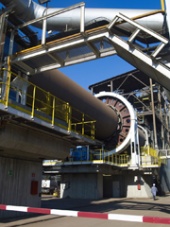
Waelz furnace in Erandio (Spain)
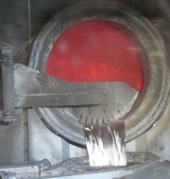
Aluminum leaves facility in Las Franquesas del Vallés (Spain)

Abengoa facilities in Lünen (Germany)
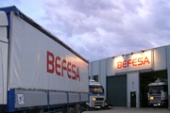
Waste management facilities in Ajalvir, Spain

Abengoa facilities in Iskenderun, Turkey
© 2011 Abengoa. All rights reserved
